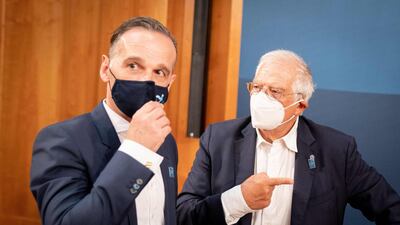Germany has called for an end to naval exercises in the eastern Mediterranean as tensions between Greece and Turkey continue to escalate in the area.
The German Foreign Minister, Heiko Maas, said military drills around the disputed waters needed to end before talks between Athens and Ankara could progress.
Mr Maas addressed reporters ahead of an informal meeting of EU foreign ministers in Berlin to discuss possible sanctions against Ankara over its aggression in the eastern Mediterranean.
"The situation remains very difficult," he said. "The precondition for these talks is that the manoeuvres that are going on in the eastern Mediterranean be ended.
“Each side can make its contribution to that and so create the space for diplomatic talks, because for sure the parties won't sit down at the table if warships are facing off in the eastern Mediterranean.”
Decades old disputes, between Greece and Cyprus on one side and Turkey on the other, in the region have become increasingly fraught in recent weeks.
The standoff over maritime borders in the region restarted after Turkey sent its survey vessel, the Oruc Reis, to carry out seismic research in waters, believed to contain natural gas deposits, off eastern Greek islands.
Greece and the EU have said that Turkey's exploration operations in the area are illegal. Turkey has said it should have access to waters on the islands because they lie on its continental shelf.

The Oruc Reis was accompanied by half a dozen Turkish warships. The majority of the Greek naval fleet has been put on alert since the research vessel's arrival.
The two sides have come to the brink of a full-on naval clash at least once but climbed down after the intervention of German Chancellor Angela Merkel.
On Thursday, as EU ministers arrived in Berlin, Turkey issued a navigational warning, saying it would hold live-fire drills in the eastern Mediterranean at the start of September off the north eastern coast of Cyprus.
France said on Wednesday it had begun naval exercises in the eastern Mediterranean alongside Greece, Cyprus and Italy. Paris has vowed to support Athens and Nicosia in the ongoing dispute.
Speaking ahead of the EU meeting, Cypriot Foreign Minister Nikos Christodoulides repeated Nicosia's calls for sanctions against Ankara.
"Europe's credibility is at stake. The European Union, a union of 27 member states, must stand up for international values, for a global international order based on the values and principles of the European Union," Mr Christodoulides said.
He also implied that Nicosia would not support the prospect of sanctions against political figures in Belarus if similar restrictive measures against Turkey were not forthcoming.
“We are not in favour of double standards here,” Mr Christodoulides said. “It's very important to also protect the credibility of the European Union.”
The standoff in the eastern Mediterranean has exposed cracks not only within the EU but also between Nato allies. Nato Secretary-General Jens Stoltenberg said on Thursday that he was in "constant contact" with Greece and Turkey.
"My message is that the situation must be resolved in a spirit of allied solidarity and in line with international law," Mr Stoltenberg said as he met German Chancellor Angela Merkel in Berlin. "Dialogue and de-escalation are in everybody's interest."
Turkey has continued to point the finger of blame for the escalation in the eastern Mediterranean at Greece and France. Turkish Defence Minister Hulusi Akar said Ankara would not be deterred by the show of force.
"To believe that it would be possible to thwart the Turkish armed forces operations with exercises and similar activities is nothing more than a pipe dream," Mr Akar said, according to Turkish state media.












